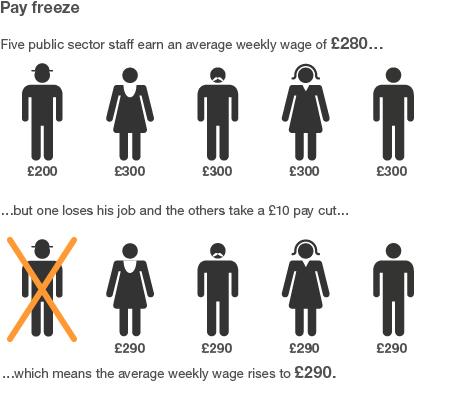Why does pay go up in a pay freeze?
- Published
- comments

As many public sector workers, and plenty of people elsewhere, experience a "freeze" on pay, Michael Blastland explains in his regular column why that does not necessarily prevent wages appearing to rise.
Here's a headline from some time in 2011: "Now public sector busts pay-freeze"
First the bankers, next state employees?
Will it be true, as some will be tempted to say, that cosseted public sector workers outsmart the government, again, despite the rhetoric?
When it happens, if it happens, don't be fooled. It might mean what it appears to mean - or it might not.
Why the doubt? Because public sector pay can be frozen exactly as the coalition government says it should be, and will be, while average public sector pay goes up.
Take a moment to ponder that apparent nonsense - then read on to find out why.
Public sector pay seems to have outpaced private sector pay during the recession and that's caused resentment. Chancellor George Osborne announced a two-year pay freeze for the public sector. So - up, down or flat - it will be big news. Will the chancellor be frustrated?
First, there will be some real increases. Mr Osborne allowed a flat-rate rise of £250 a year for those on less than £21,000. This benefits about a third of public sector employees by at least 1.2%. There'll also be some multi-year pay deals that have to be honoured.
But some effects are not about the level of any individual's pay. It would be possible for every last employee's pay to fall, but for average (mean) pay to rise. This is the riddle of the average.
For average pay is about not just the level of individual pay, but who those individuals are: the composition of the workforce. If the staff mix changes, even though no one has a pay rise, the average can go up. It shows why comparisons of pay between public and private sectors can be naïve and misleading.
To see how this works, see what happens in the example below.

There are various ways in which the changing composition of a workforce can make average pay rise.
1. The first people out the door when jobs go are likely to be casual or on fixed-term contracts. They tend to be on lower pay than the average, often junior. Take them out of the mix and the average of the remainder rises.
2. Health - on average - has more people on higher pay than education. If overall cuts in education lead to more job losses than in "protected" health, the composition might shift towards higher-paid staff.
3. Geographical composition might also change. Big central government departments tend to be based where wage rates are lower, outside London and the South East. Cuts in low-paid staff outside London would, again, increase the average pay of those left.
4. A pay freeze alongside cuts in staff numbers might mean increases in the number of hours worked - and more pay - for part-time staff who remain, even if total hours fall for all employees put together.
None of this is to argue that these things should happen, simply that they might. In short, average pay might rise, but public sector workers might not see it that way, and the chancellor might still have been successful. The lesson is: beware averages.
These explanations come from a tasty piece of analysis by a statistician at the Office for National Statistics. You can read it - with more detail - here, external.
ONS staff are sometimes shy of commenting on newsworthy issues. It's a shame. A good statistician with good imagination can shed more light on the what and the why than any number of the usual talking heads.
In this case, the point about composition illustrates a general problem with averages as a measure of change. The average sea level at your seaside holiday destination is easy to observe on a calm day at a given hour. Now try when it's stormy.
Working out average pay is like watching a stormy sea where you switch your gaze from one spot to another, trying to determine how it would look if flat.
The concept of average (mean) pay encourages us to imagine John or Jane somewhere in the middle and somehow representative of the rest. But the average might be a perpetually changing individual nowhere near the middle. See Go Figure here, external.
So will we ever know what happens to public sector pay during the freeze? There is a survey that measures the pay of the same individuals and avoids the composition problem. It comes out once a year. Like watching the tide, we might have to wait.